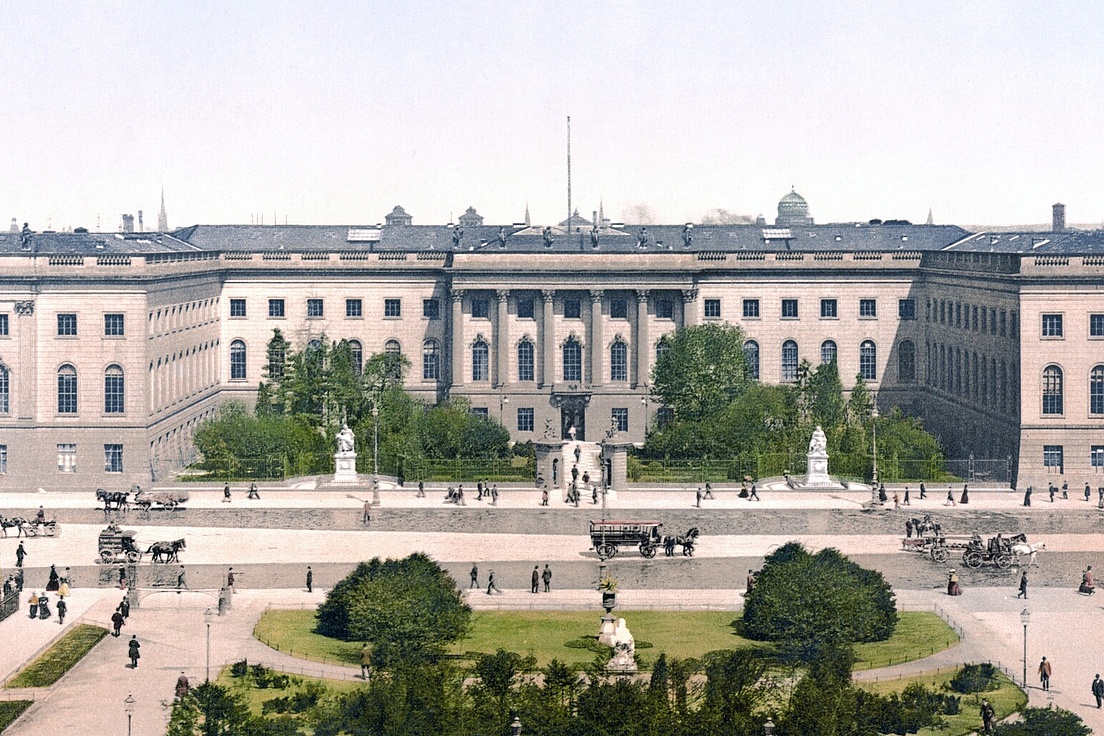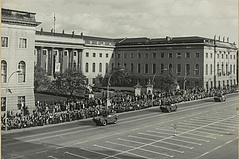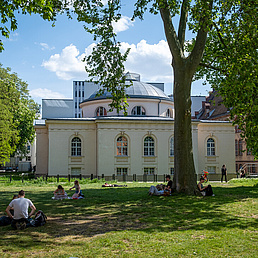Founding of the university
The "University of Berlin", undisputedly prominent worldwide, criticised and praised from the outside and inside at the same time, has its own history. Opened in the winter semester of 1810, from 1828 called "Königliche Friedrich-Wilhelms-Universität zu Berlin" and since 1949 "Humboldt-Universität zu Berlin" (HU), it represents, on the one hand, the teaching and research practice of one of the modern universities founded around 1800. On the other hand, its history proves that the name "Humboldt" is both a privilege and a burden for a university.
It begins with the foundation: In 1810, Wilhelm von Humboldt finally succeeded in founding a university in Berlin - despite the political crisis in which Prussia found itself, despite strong opposition from the Prussian government, which, for example, rejected the university's desired financial autonomy, and despite the fact that a large city is considered unsuitable for universities. Humboldt nevertheless succeeded in founding the university in a form in which the tradition of the European university - including the organisation of faculties and governance by professors, rector and senate - was combined with contemporary reform ideas such as the validity of the research imperative, the unity of research and teaching and the autonomy of academic work to form a tense unity.
The modern original - mother of all research universities
The result is an alma mater that is still internationally recognised today as the "mother of all research universities". It soon became the largest German university, with 8,000 students as early as 1914, and was open to women in study and research from 1908. After 1900, the university expands into the city and the Charité reaches its new size, also thanks to the work of Ministerial Director Friedrich Althoff.
"Humboldt model": myth and reality
In the 20th century, this foundation was exaggerated to become the "Humboldt model" by attributing structures and effects to it that did not apply to Berlin at all. Contrary to what his "myth" says, Humboldt did not establish the university as a purposeless institution, far removed from the state and society, academic professions and economic importance, autonomous in all dimensions. Rather, he praised its benefits for Prussia's glory and economic well-being to the king, enforced strict examinations to protect the state from mediocre qualifications, and reserved the right of appointment to the state, for example, because he was sceptical of the professors' self-interest. In addition, the university successfully sought links with the city's culture and major industry, early on and then continuously. The international impact, never as a copy, always locally moulded, can also be said to be more in favour of the German model of the university than exclusively for the "Humboldtian" one. But however differentiated the impact was, the research imperative prevailed, as did the clear distinction between technical colleges and universities or the integration of the natural sciences. With the practice of its disciplines, the University of Berlin truly became a model.

The history of Humboldt-Universität in pictures
Opened in the winter semester of 1810, from 1828 "Königliche Friedrich-Wilhelms-Universität zu Berlin", since 1949 called "Humboldt-Universität zu Berlin".
Famous scholars - pioneers of the disciplines
This manifests itself in both people and structures. It was famous scholars who were appointed to Berlin in 1810 or have been active here ever since and who established the modern self-image of many disciplines in the first place. This applies to Schleiermacher in theology, Reil in medicine, Savigny in law, Fichte, then Hegel in philosophy, Thaer and agricultural science - because this was also part of the founding - as well as the scholars from Wolf to Böckh, from Niebuhrto Ranke, with whom the philological and historical disciplines in the Faculty of Philosophy reinvented themselves.
Research as a driver of change
Research is also changing the old, "upper" faculties, especially in medicine. The laboratory became a place of revolutionary change in research on man and nature, and not just with Virchow. The theory and method of the natural sciences take on a new form with Helmholtz, for example; biology, chemistry and technology combine to form a pioneering practice of the natural sciences even before 1900.
Long before Nobel Prizes were awarded and Berlin's fame further increased, the university was an internationally recognised research university. One of its most prominent historians, the liberal Theodor Mommsen, a fierce opponent of the anti-Semitic outbursts of his colleague Treitschke in 1888, was awarded the Nobel Prize for Literature in 1902.
The realisation of the research imperative
However, it is not only great scholars who are significant for the practice of the disciplines, but also structures and standards: Very early on, strict quality criteria were used in Berlin to improve the doctoral system, which was still extremely lax at other universities until well after 1850. As early as 1810, research achievements and publications counted for appointments, and competition became so strong that Berlin only became accessible to mature scholars and soon gained the highest prestige in the ranking of German universities.
The disciplines were also modernised by the introduction of the habilitation, which demanded specific professional achievements and thus set in motion the differentiation of the subjects, not only in medicine, but here with particularly far-reaching consequences. Many specialisations in clinical practice were due to the work of Jewish private lecturers in particular, who did not become full professors but were able to work successfully - at least until the forced dismissals by the Nazis in 1933, which hit them particularly hard.
After 1933, the institutional structure of the university also changed. The colleges of agriculture and veterinary medicine were integrated as separate faculties, the Faculty of Philosophy was split, and the natural sciences became independent. Finally, a "foreign university" was founded as an expression of the National Socialist enslavement of the university, which it had itself intensively sought.
University and state, adaptation and self-assertion
By now, from 1933 at the latest, the political history of Berlin University also becomes visible in its highly problematic traditions. The ties to the state itself are not new. Humboldt, but above all Fichte, the first elected rector, defined their self-image from the anti-French pathos of the Wars of Liberation. In the German Empire, the biologist du Bois-Reymond elevated the university's professors to the "personal regiment of the Hohenzollerns", and quite rightly so, as the majority of its members were culturally Protestant, nationally and monarchically orientated. After 1918, the young democracy was interpreted as a threat and rejected by most professors and students. But throughout the 19th century, this political localisation was always linked to the clear distinction between political and academic freedom. This is why, during the so-called "persecution of demagogues" from 1818/19 onwards, Schleiermacher, for example, voted strongly against all interventions that restricted academic freedom. A philosopher such as Friedrich Paulsen once again defended the autonomous right to recruit private lecturers towards the end of the century when the king tried to prevent the socialist and physicist Leo Arons from becoming a university member. Wilhelm II had to issue the "Lex Arons" in 1898 because the university did not follow his wishes.
National Socialism
The university did not show this courage in the face of those in power and this solidarity with its members in 1933. On the contrary, with a few exceptions, professors and university committees uncritically accepted the dismissal of Jewish scholars and even supported it. The students, the majority of whom had been close to the National Socialist Student Union since 1930, staged the book burning on 10 May 1933 on the Opernplatz in front of the university together with the SA and the Nazi pedagogue Alfred Baeumler. A lawyer, Carl Schmitt, defended the assassination of the SA leaders - "The Führer is the law" -, doctors participated in the crimes of euthanasia, agricultural scientists provided arguments in favour of the wars of conquest in Eastern Europe. Only a few members of the university were active members of the resistance.

GDR times
After 1945, the university first had to find its place between the occupying power and SED rule, a denazification that was hardly vigorously practised and the reopening. This was also a political problem, as most clearly documented by the protests of Berlin students against the renewed seizure of the university and the founding of the Free University , which they pushed for.
Despite these conflicts in the name of the Humboldt brothers, the HU existed as the capital city university of the GDR from 1949 until its self-renewal in 1989 in a complex mixture of voluntary submission and the imperative of free research still sought by individuals. The structures of universities under socialism - in the simultaneity of sectional organisation and faculties, SED regime and Stasi presence, educational ambition towards students and control of communication for all - were only compatible with the Humboldt tradition in that Wilhelm and Alexander were radically reinterpreted in the socialist spirit and as representatives of a "militant humanism" in the context of the East-West conflict.
A new start in the tradition of reform ambition and claim to excellence
This situation came to an end in 1990. Initiated from within by students and teaching staff, the university only found its own form after lengthy, conflict-ridden processes with the state of Berlin, internally in the new committees and with newly appointed players. In the 1990s, it was reorganised in the name of its innovative tradition and the liberalism associated with the Humboldt brothers, with a disciplinary basis in research and teaching, open to interdisciplinarity. The freedom of research and teaching was re-established in law, the relationship with the state was also stabilised economically in contractual regulations, the university's ability to act and innovate was secured with the presidential constitution, all members of the university were involved in its self-administration, and a self-image in the spirit of legitimate traditions was adopted. The success in the Excellence Initiative, symbolised in the Humboldtian slogan "Education through Science", has shown worldwide since 2012 that it is once again the practice of the disciplines, the teaching staff and the students, in which the "University of Berlin" shows its real strength.
// Text: Prof. i. R. Dr Dr h.c. Heinz-Elmar Tenorth



































